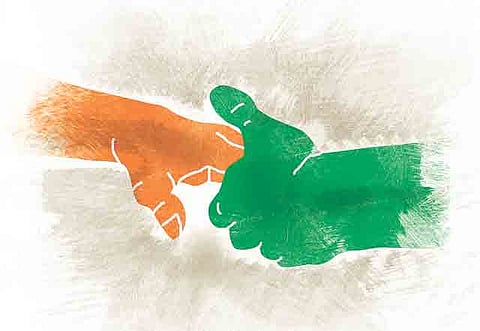Pakistan ups the ante on Kashmir
Can a solution, a humane and just one, be found, without one party or the other bickering for the upper hand?

The unrest in Kashmir is real. More than 100 people have died in unending street protests in the Kashmir Valley since June 11 in firing by security forces on stone-pelting demonstrators, and curfew continues across the Kashmir Valley. One more youth, injured in clashes with security forces, died in the hospital last week taking the death toll in the valley to 103 since the latest rounds of violence began three months ago.
The situation was grave enough to prompt an all-party delegation to be dispatched from New Delhi to try to determine an acceptable framework of issues and reduce the tensions.
Described as the first major initiative by the central government to reach out to Kashmiris after three months of street protests and firing by security forces that left among the dead women and children, the fact-finding mission, led by Indian Home Minister P Chidambaram, held consultations with the representatives of the ruling National Conference, who reiterated their demands for greater autonomy for the state during the talks.
Pakistan's Foreign Minister Shah Mahmoud Qureshi, in New York for a UN session, urged that the United States put pressure on India over Kashmir to bring this dispute to an end by honouring the rights of the Kashmirisin the disputed territory. New Delhi and not Islamabad was to blame for the recent unrest in the Himalayan state, he intimated.
Speaking before the Council on Foreign Relations, Qureshi said, "The occupation cannot continue. The rights of the Kashmiri people cannot continue to be denied. We call upon the United States particularly, which is pressing so responsibly for peace in the Middle East, to also invest its political capital in trying to help seek an accommodation on Kashmir."
"Such an accommodation would not only be just for the people of Kashmir but would be critical for peace in the region," he said, adding that "terrorism... has fuelled and thrived on blatant examples of social and political injustice. At times it's easy for the Indians to look towards Pakistan and blame Pakistan for everything that's going wrong in Indian-occupied Kashmir [Jammu and Kashmir], but no one any longer can seriously believe this. Can Pakistan orchestrate thousands of people? Can Pakistan plan, sitting in Islamabad, a shutdown all over Kashmir?" he said.
Speaking before television, Pakistan's foreign office spokesman Abdul Basit stated that India "should adhere to accepted human rights standards rather than stereotypically blaming Pakistan." The Pakistani foreign ministry was emphatic in their view that it was high time Delhi reviewed its position on Kashmir as being an integral part of India. "India should revisit its approach and its Kashmir policy rather than trying cosmetic measures here and there because this is not going to bring about any difference as far as the Jammu and Kashmir dispute is concerned."
"Unless India takes a fresh look at its Kashmir policy, does some introspection and stops treating Jammu and Kashmir as its integral part and stops harping on seeking a solution within the Indian Constitution, we do not believe that we can really have any meaningful or result-oriented discussions with India on this issue."
Instead of routinely and automatically blaming Pakistan, India should consider a serious revamp of its policies that are in sharp variance to its international commitments, including adherence to accepted human rights standards, Abdul Basit concluded.
Resolutions were also passed by Pakistan's National Assembly and Senate condemning the high-handed ‘‘brutality and human rights violations'' in Jammu and Kashmir, and pledging diplomatic and moral support for the "people's movement."
Resolutions rejected
Responding to these charges, Indian foreign ministry spokesperson Vishnu Prakash said "We have seen reports of resolutions on Jammu and Kashmir that have been passed in the National Assembly and the Senate of Pakistan. We reject these resolutions. They have no standings on what is purely an internal affair of India. Pakistan should tackle the issues of constitutional safeguards, democracy, extremism, terrorism and human rights violations in the part of Jammu & Kashmir under its illegal occupation". The spokesperson maintained that it was crucial for Pakistan to honour its stated commitment of not allowing any territory under its control to be used for "terrorism directed against India in any form". "In the spirit of true rationality, India desires good neighbourly relations with Pakistan. We are committed to resolving all outstanding issues through dialogue."
The Kashmiris should not be faulted for believing they are caught in a ping-pong game of diplomacy between two nuclear-powered neighbours that has brought no satisfactory conclusions to their ambitions for the past 60 years. And ruled by a political family, the Abdullahs, who many Kashmiris believe use the on-going conflict to tighten their grip on what the Abdullahs consider as their ‘personal fiefdom', the future does not bode well.
Can a solution, a humane and just one, be found, without one party or the other bickering for the upper hand? After all, should not the will of the people living in the region prevail?
- Tariq A. Al Maeena is a Saudi socio-political commentator. He lives in Jeddah, Saudi Arabia.



